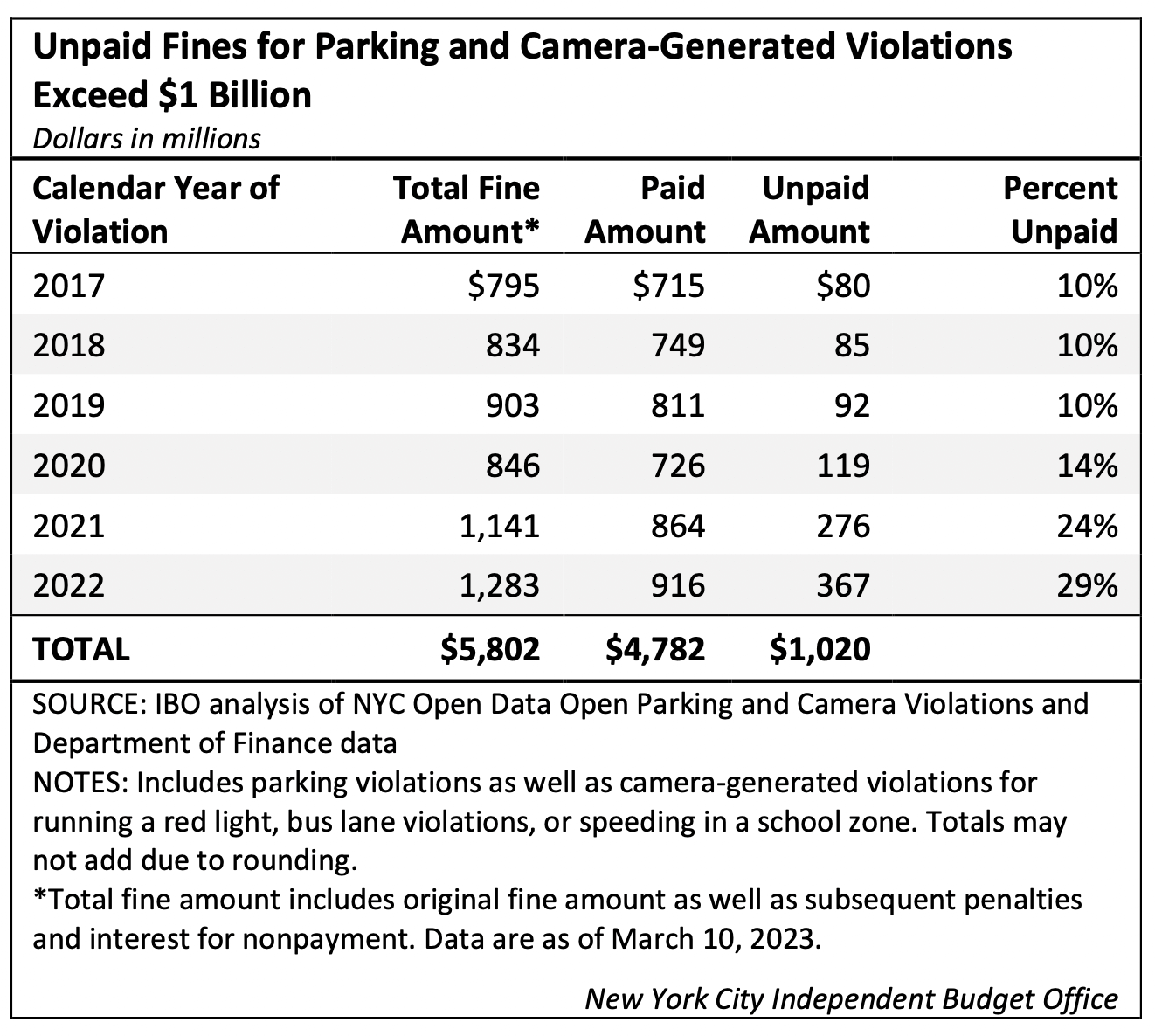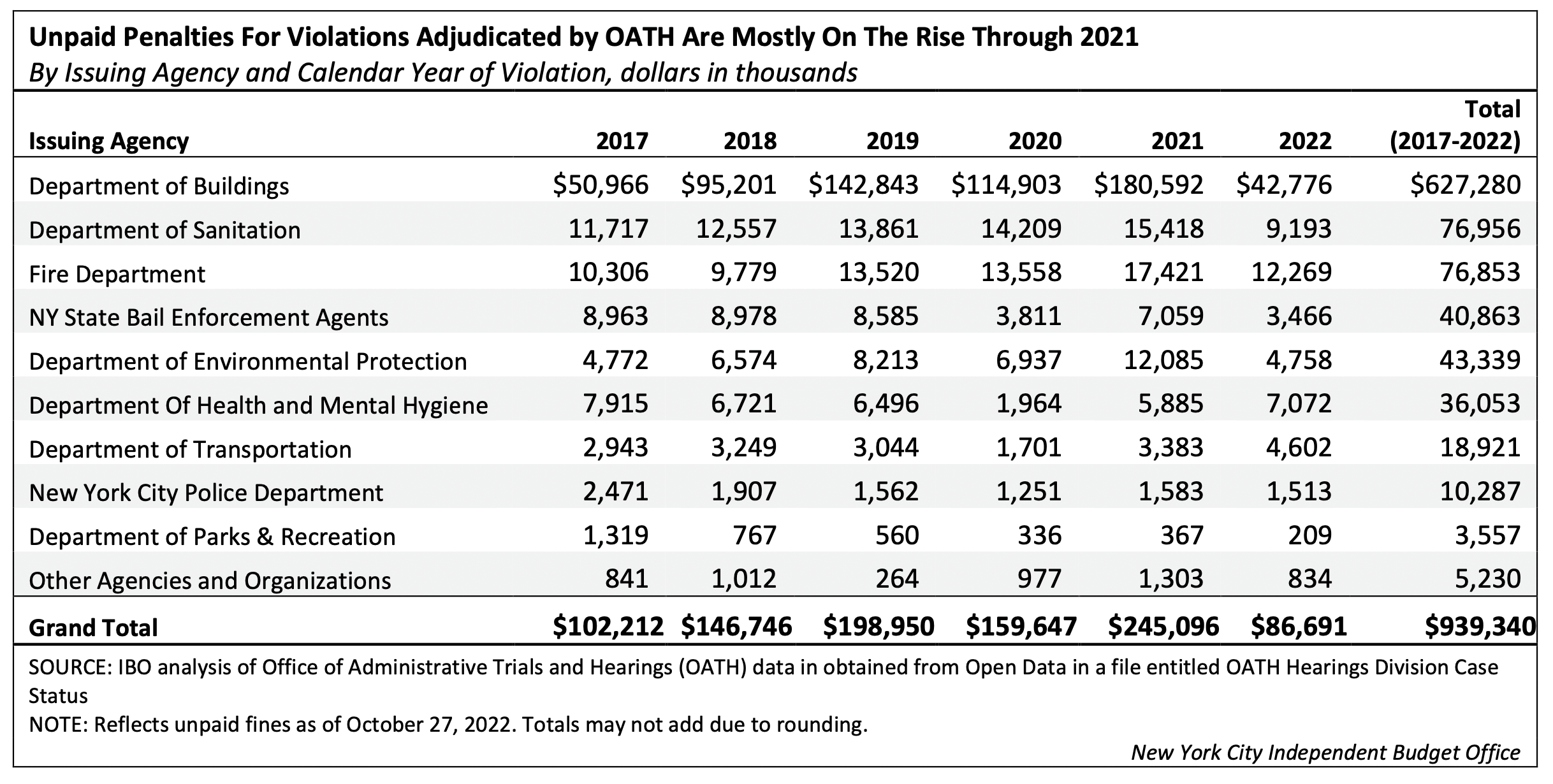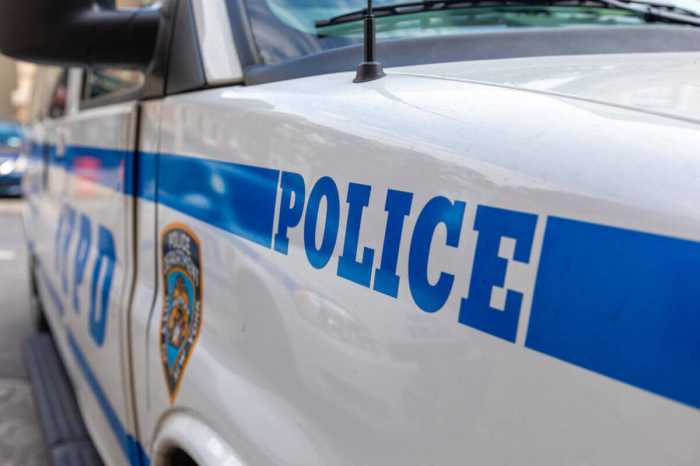Along with failing to pay more than a billion dollars in parking and speeding tickets, New York scofflaws are also skirting the system for violations on a host of other offenses, according to the Independent Budget Office’s April 5 report.
Those violations, accrued over a six-year period, are from three primary sources including $150 million in lienable property charges and $940 million in unpaid penalties from the city’s Office of Administrative Trials and Hearings (OATH), the IBO reported.
Along with $1 billion in unpaid parking and speeding tickets, the IBO estimates the total unpaid amount from these three sources since 2017 is around $2.1 billion.
According to the IBO report, “these three measures are by no means exhaustive, and are likely an undercount of the total amount of debt that the city is owed.” Other areas not included are sales, income, business taxes, water and sewer charges, and cash bail and bail bonds.
The other departments that accounted for 97% of total fine revenue in 2022 are the Departments of Environmental Protection, Housing Preservation and Development, Health and Mental Hygiene, and Consumer Affairs.
Here is a breakdown of the three big fine hitters for New York City, according to the most recent IBO report.
Parking & speeding, red light, and bus lane violations
As of March 10, there were more than $1 billion in unpaid fines from 2017 through 2022.
The Department of Finance’s New York City Parking Violations Bureau successfully collected $916 million in calendar year 2022 from parking violations and camera-generated fines for speeding and running red lights. The total amount levied was $1.3 billion, with 29% going unpaid.
Parking violations and speed camera fines typically constitute more than two-thirds in unpaid fines in any given year.
“Parking violations has always been the single biggest category,” said Bernard O’Brien, senior budget analyst at the NYC Independent Budget Office. “That hasn’t changed.”

Lienable property charges
Lienable property charges are billed to property owners in New York City, usually for nonpayment of emergency repair or property taxes.
When these property charges are unpaid, this can result in a lien being placed against the property. Homeowners can then experience challenges in financing or selling property, and eventually the property being seized by the city and foreclosed.
The two largest categories are liens by the Department of Housing Preservation and Development (HPD) and the Department of Finance (DOF). Most of the unpaid lienable property charges were from the HPD. HPD charges mostly come from unpaid emergency repair bills and fees from the Alternative Enforcement Program, which oversees building maintenance inspections and issues orders to correct any violations. The DOF charges are primarily from unpaid property taxes.
There were over $150 million in unpaid lienable property changes as of Jan. 12 incurred from 2017 through 2022, according to the report.
While the IBO report did not include the amount the city collected in the 2022 calendar year, New York City Comptroller Brad Lander found that the city received roughly $96.3 million of real property tax liens in the 2022 fiscal year, according to Lander’s report published in October 2022.

OATH penalties
The Office of Administrative Trials and Hearings (OATH) is an independent administrative tribunal that issues public safety and quality of life violation notices through more than 20 city agencies.
The most common violations are uncleaned sidewalks, improper storage of receptacles, illegal posting of handbills, loose rubbish, residential recycling violations, and sidewalk obstructions, according to the IBO report.
More than $939 million in OATH penalties from 2017 through 2022 is currently owed.
Most of those penalties were issued by the Department of Buildings, the Department of Sanitation, the Fire Department, and the State Bail Enforcement Agents — in that order.
While the IBO report did not include the amount the city collected in the 2022 calendar year, New York City Comptroller Brad Lander found that the city collected $114 million in Environmental Control Board and OATH fines in the 2022 fiscal year, according to the comptroller’s October 2022 report.

State Comptroller Tom DiNapoli has published audits of the DOF to determine whether fines for parking violations are collected. The comptroller found in 2021 that the city’s DOF “did not maximize collection of fines and fees owed for various traffic and parking violations, and DOF has not always taken action to collect the fines and fees.”
It’s unclear whether the city has implemented more plans or processes to collect debt from lienable property charges, OATH violations, and other areas.
amNewYork Metro has reached out to the Department of Finance regarding its plan of action to increase collection of fines, and is awaiting a response.




































